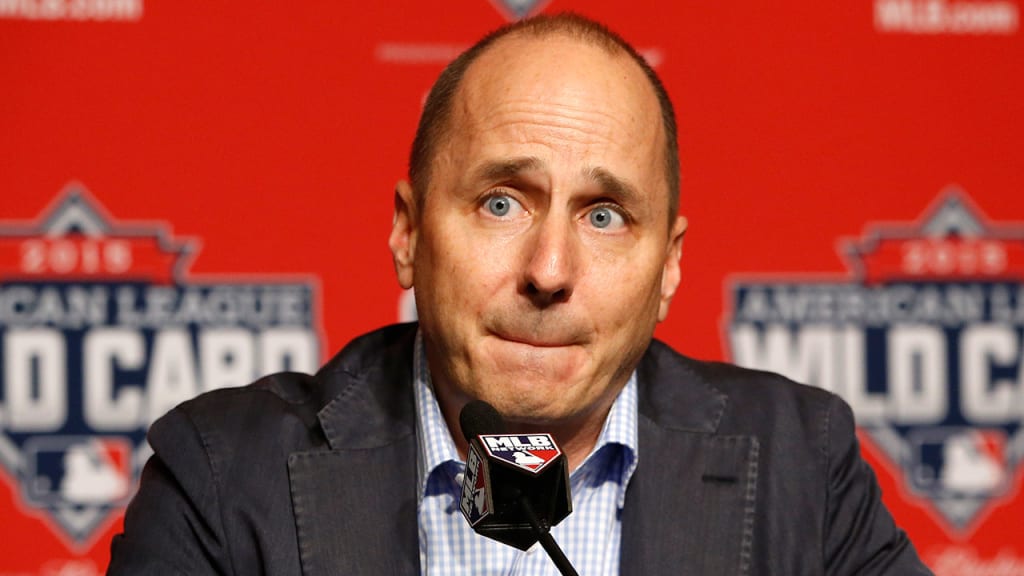
In the 1993 movie "Groundhog Day," Bill Murray's weatherman character has numerous opportunities to make changes as he lives the same day repeatedly. MLB.com reached out to general managers around the league to find out for which of their trades they'd like a do-over.
The deal was announced 17 years ago this week, as Yankees general manager Brian Cashman hoped to improve his team's pitching depth by importing three well-regarded prospects from the Marlins: left-hander Ed Yarnall and right-handers Todd Noel and Mark Johnson.
In return, the Yankees shipped away third baseman Mike Lowell, a swap that Cashman rates as the worst of his tenure as GM. Lowell would go on to a productive 13-year career in the Majors, while only Yarnall ever wore the pinstripes, making seven forgettable appearances.
"We had Scott Brosius and we had a lack of pitching depth in the system," Cashman recalled. "For the right circumstance, we were willing to move Mike Lowell, who was blocked by Brosius. He'd obviously had a lot of success with us and helped us in the '98, '99, 2000 World Series pushes, including 2001, where we obviously fell short in Game 7.
"So we secured three high-ceiling starters -- Eddie Yarnall, Todd Noel and Mark Johnson, all three high [Draft] picks, all three with high ability. But all three busted. I know when the deal was done, it was something that we secured three high-end arms in the system, but none panned out."
Yarnall was a third-round pick of the Mets who was dealt to Florida in the Mike Piazza deal, but the touted prospect's career stalled with the Yanks. Yarnall compiled a 5.40 ERA in 20 big league innings and was shipped to the Reds as part of the five-player deal that brought Denny Neagle to New York in July 2000.
Johnson was a first-round pick of the Astros in 1996, taken 19th overall, but his big league career spanned just nine games for the 2000 Tigers. The Tigers plucked Johnson from the Yankees in the 1999 Rule 5 Draft, and to avoid offering Johnson back to the Yanks, Cashman said Detroit instead released Johnson and re-signed him to a Minor League contract.
"Baseball has since changed the rules, because that was an illegal move," Cashman said.
Noel was a first-round pick of the Cubs in 1996, selected 17th overall, but his final inning came at age 21 with Class A Advanced Tampa in 2000.
"He was a guy throwing 100 mph in the Florida State League for us, but then he blew out his shoulder," Cashman said. "He was obviously an exciting talent before the talent was taken from him."
Because the Yankees had just signed Brosius to a three-year, $15.75 million contract, it's unclear what role Lowell -- just 25 years old then -- would have played in the organization, had he not been traded.
''I know the label on me was that I could hit, but defense was a question mark," Lowell told The New York Times in 2003. "Getting Brosius was a great answer, because they knew his defense would be solid and his offense would be icing on the cake. He turned out some pretty good years. Their upper management made the right decision."
Yet the Yanks never predicted that Lowell would go on to an impressive career with the Marlins and Red Sox, earning four All-Star selections and compiling a .279 average while slugging 223 home runs.
"We're in a better position, I think, because of analytics and our education on it," Cashman said. "The data streams and stuff, I'm not sure if it would have changed the decision-making back then or not. We didn't have access to that type of stuff back then. I think it was a trade of need for both organizations. We had depth to trade from, as did the Marlins. It just didn't work on our end. It worked out for them."